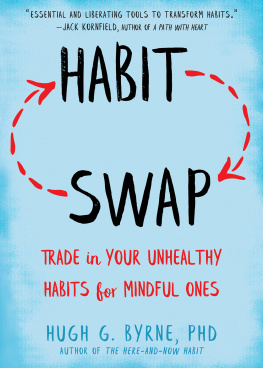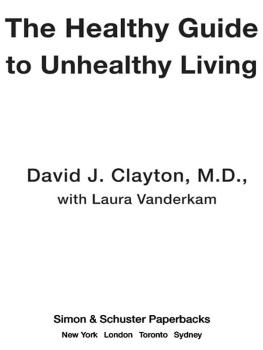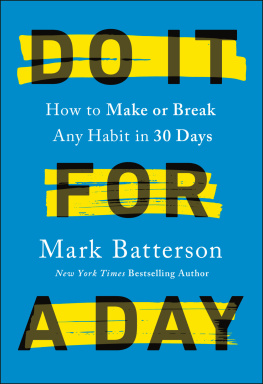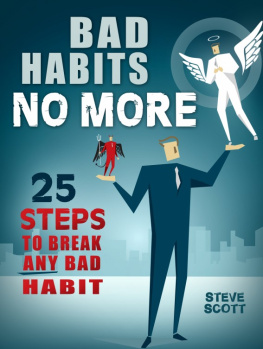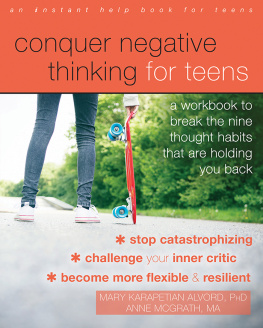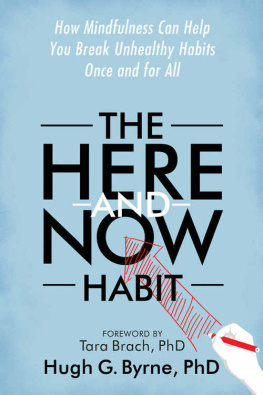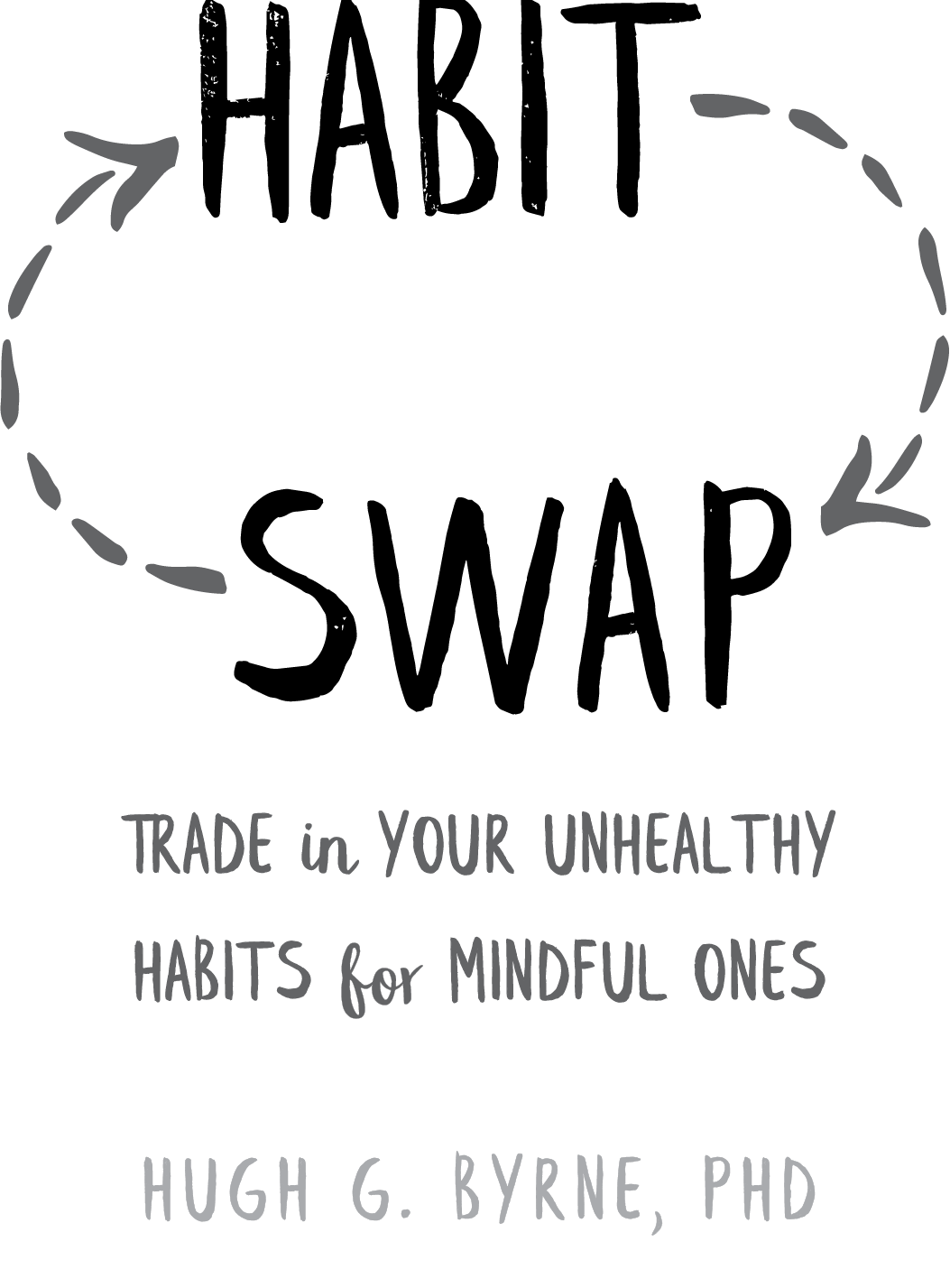This thoroughly practical book is also a profound exploration of freedom and choice. Drawing on recent science about rewiring the brain, it explains how to become free of harmful habits of eating, drinking, speaking, and reacting. And with the gentle guidance of a senior mindfulness teacher, this process of coming home to oneself and becoming again someone who truly choosesfeels soulful, nurturing, and heartfelt. A lovely, important book.
Rick Hanson , author of Resilient
The good thing about habits is, through awareness, we can change themfor the better! In this witty and practical guide, Hugh Byrne shows us how to work with our mind in ways that swap bad habits for more honesty, intimacy, and harmony in our day-to-day lives. An intentional guide for those wanting to live a more mindful life.
Ruth King , Insight Meditation teacher and author of The Emotional Wisdom Cards and Mindful of Race: Transforming Racism from the Inside Out
These are essential and liberating tools to transform habitspractical, simple, and wise.
Jack Kornfield , author of A Path with Heart
If you can bring your habitual patterns of thinking and acting into an accepting, kind, and mindful presence, you have the key to happiness and peace. Hugh Byrnes brilliant new book on habits guides you in this pathway, applying mindfulness to some of our most difficult, persistent, and unhealthy habits. Please read and share with othersthese teachings are a gift to all who seek inner freedom.
Tara Brach , author of Radical Acceptance and Radical Compassion
The foundation of Habit Swap is that an untrained mind is the root cause of our suffering, and that the untrained mind almost always functions on autopilot or in a state of unawareness. Through his thorough exploration of mindfulness practices, Byrne shows how to lift the veil of unawareness to make what was invisible visible, leading to happiness and a sense of who we really are.
Sharon Salzberg , author of Lovingkindness and Real Happiness
Publishers Note
This publication is designed to provide accurate and authoritative information in regard to the subject matter covered. It is sold with the understanding that the publisher is not engaged in rendering psychological, financial, legal, or other professional services. If expert assistance or counseling is needed, the services of a competent professional should be sought.
Distributed in Canada by Raincoast Books
Copyright 2020 by Hugh G. Byrne
New Harbinger Publications, Inc.
5674 Shattuck Avenue
Oakland, CA 94609
www.newharbinger.com
Cover design by Amy Shoup; Acquired by Jess OBrien; Edited by Marisa Solis
All Rights Reserved
Library of Congress Cataloging-in-Publication Data
Names: Byrne, Hugh G., author.
Title: Habit swap : trade in your unhealthy habits for mindful ones / Hugh G. Byrne.
Description: Oakland, CA : New Harbinger Publications, [2020] | Includes bibliographical references.
Identifiers: LCCN 2019055181 (print) | LCCN 2019055182 (ebook) | ISBN 9781684034086 (paperback) | ISBN 9781684034093 (pdf) | ISBN 9781684034109 (epub)
Subjects: LCSH: Habit breaking. | Self-control. | Mindfulness (Psychology)
Classification: LCC BF337.B74 B97 2020 (print) | LCC BF337.B74 (ebook) | DDC 158.1--dc23
LC record available at https://lccn.loc.gov/2019055181
LC ebook record available at https://lccn.loc.gov/2019055182
To my late parents,John and Kathleen Byrne,with love and gratitude.
Contents
Introduction
The simple message of this book is that you can transform your life by changing your habits. And mindfulness conscious awareness of your experienceis a key to changing your habits.
Mindfulness brings into conscious awareness habitual behaviors that have become automatic and unconscious through repetitionit makes what was invisible visible. We are then in a position to think, speak, and act in ways that lead to greater well-being and freedom. This is the promise of mindfulness when applied to letting go of unhealthy and unwanted habits and cultivating more beneficial ones.
In my previous book on mindfulness and habit change, The Here-and-Now Habit (Byrne 2016), I explored the science of habit formation and habit changeand why and how the cultivation and practice of mindfulness are a critical path to changing habits and living with greater freedom and ease.
In this book, we dig more deeply into ways of working mindfully with particular habits, from spending large swaths of time online to eating or drinking unconsciously to putting off important tasks, for example. We explore how we can let go of unhelpful habits and develop more beneficial ones. We look at how to bring mindfulness to both the roots of our habits and their expressions (behaviors). These skills help us identify and work with even the most entrenched habits.
Beyond skills, practices, and techniqueswhich are important and necessarywhat mindfulness brings to our lives and to our effort to change habits is a way of being that creates the soil within which needed change can happen.
The spirit of mindfulness and the spirit with which we approach mindful habit change is one of acceptance, compassion , and nonjudgment :
- When we meet our habits with acceptance , we acknowledge the truth of our experienceeven when it may be painful to accept. This becomes the place from which wise and necessary change can begin.
- Meeting our experience with compassion , we open space to our difficulties and the conditions that may have contributed to them with kindness.
- With nonjudgment , we acknowledge things as they are and bring interest and curiosity to what were experiencing. With this greater awareness, were able to determine wise means of responding.
In this spirit, there is not a good you trying to discipline or change a bad you, or a stern taskmaster telling you how you should be acting. Rather, with nonjudgmental awareness, we can bring a compassionate understanding to the ways in which all of us, given particular conditions and experiences, can make choices that lead to harm. We can see that our brains, programmed by thousands of years of evolution, can at times abet us in forming habits that dont ultimately benefit us. With this knowledge, we take responsibility for our actions and words without blame or harsh judgment. We learn to take action that leads to our own and others well-being.
In the first three chapters, we present the promise of mindfulnessand the power of meditationin helping us let go of unhealthy and unwanted habits and in developing more beneficial ones.
In chapters 4 through 7, we engage with the roots of our habitswanting, aversion, distraction, and busynessand explore positive habitsacceptance, gratitude, compassion, joy, and othersthat help us move toward greater well-being. We also focus on stress as we work with both the roots and expressions of our habits.
In the remaining chapters, we work with the habitual behaviors as they are expressed, for example, in unhealthy eating, drinking, and consuming; unwise involvement with our devices and technology; our speech and communication; and procrastination and other unhelpful habits. We also explore ways of cultivating healthy antidotes to these behaviors.
Ive practiced mindfulness for more than thirty years. One of the things Ive found most inspiring is to know I can always begin again. No matter how many times I may have been swept up in a painful emotion, difficult mind state, or unwise behavior, freedom is always availablein this moment, this breath, here, right now.

